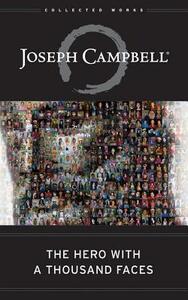Take a photo of a barcode or cover
challenging
informative
inspiring
reflective
slow-paced
When you open this book it's just a golden mirror reflecting your own face like that scene from Kung-Fu Panda where Po achieves enlightenment and realizes true power comes from living in the moment, true to himself, casting aside all manifestations of wounded ego and selfishness, learning that to be selfless you must first be your full-self if you ever want to beat that misguided tiger who literally kicked Tigress in the face or whatever.
inspiring
reflective
slow-paced
informative
mysterious
medium-paced
This was a very long read for me, mostly due to the myriad of overlying and overshadowed themes present within the author's marvellous narration of what makes a true hero in both historical and modern civilisation, present within almost every culture and subculture of humanity.
Joseph Campbell is, in my eyes, a literary genius. A step-by-step breakdown of the legends, myths and stories (both foretold and retold by both prehistoric and more modern civilisations) has added more insight into how such a concept is a state of being that currently resides within us all and not an unattainable action or blessing that is gifted to the lucky or privileged few.
Joseph Campbell is, in my eyes, a literary genius. A step-by-step breakdown of the legends, myths and stories (both foretold and retold by both prehistoric and more modern civilisations) has added more insight into how such a concept is a state of being that currently resides within us all and not an unattainable action or blessing that is gifted to the lucky or privileged few.
I was excited to finally give this classic book a read, but for no fault but my own, I had the impression this book was to be more of a guide for a storyteller rather than a thesis statement meant to bridge across the board themes of myth, religion, and fairy tales into “The Hero with a Thousand Faces” and/or “The Hero’s Journey”.
As what I believe to be the first of its kind (unless proven otherwise), this is an impressive, original feat that I greatly applaud. I was brought back to my undergrad days and I felt the toll of research and study that went into the pages. It is well organized and fascinatingly argued, and began the road to setting the standard for western storytelling.
All that said, it reads very densely and throughout the chapters the conclusions or thoughts are much too buried into would-be connections, or retellings of various relevant stories. As I was taking rigorous notes, I was all the more aware of the lack of explicit communication. The phrase “get to the point” was regularly floating across my mind.
However, since this was a thesis meant to prove a point, my intention for storytelling guidelines and his for proving his theory and therefore needing to dwell on repetitive stories to prove a point, my current rating may not be entirely fair.
I’m sure I’ll come back to this in the future with a different take, but for now it is what it is.
As what I believe to be the first of its kind (unless proven otherwise), this is an impressive, original feat that I greatly applaud. I was brought back to my undergrad days and I felt the toll of research and study that went into the pages. It is well organized and fascinatingly argued, and began the road to setting the standard for western storytelling.
All that said, it reads very densely and throughout the chapters the conclusions or thoughts are much too buried into would-be connections, or retellings of various relevant stories. As I was taking rigorous notes, I was all the more aware of the lack of explicit communication. The phrase “get to the point” was regularly floating across my mind.
However, since this was a thesis meant to prove a point, my intention for storytelling guidelines and his for proving his theory and therefore needing to dwell on repetitive stories to prove a point, my current rating may not be entirely fair.
I’m sure I’ll come back to this in the future with a different take, but for now it is what it is.
While a beautifully detailed description of the monomyth that most all stories are modeled after. This book contained too much detail and took too long to describe what it needed to. I wound up skimming it and then reading a couple analyses from other authors to really drill the point home.
Interesting ideas, but too long and repetitive for my taste. I would have liked more tie-backs to psychology - Campbell stuck more with the philosophy angle. Maybe it's unfair of me, but when he started teasing the therapy stuff, I wanted more of a self-help book, which probably didn't exist in 1949. It's not you, Campbell, it's me. My favorite idea was that therapists are modern-day medicine women, guiding us through rites of passage now that religion is mostly dead.




